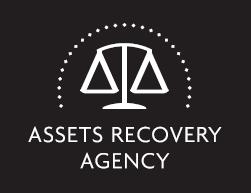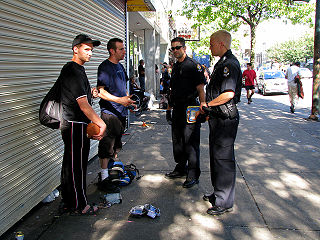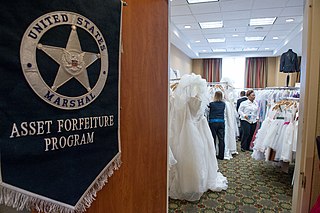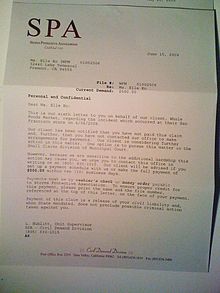A statute of limitations, known in civil law systems as a prescriptive period, is a law passed by a legislative body to set the maximum time after an event within which legal proceedings may be initiated. In most jurisdictions, such periods exist for both criminal law and civil law such as contract law and property law, though often under different names and with varying details.

Theft is the act of taking another person's property or services without that person's permission or consent with the intent to deprive the rightful owner of it. The word theft is also used as a synonym or informal shorthand term for some crimes against property, such as larceny, robbery, embezzlement, extortion, blackmail, or receiving stolen property. In some jurisdictions, theft is considered to be synonymous with larceny, while in others, theft is defined more narrowly. A person who engages in theft is known as a thief.
Champerty and maintenance are doctrines in common law jurisdictions that aim to preclude frivolous litigation:
Larceny is a crime involving the unlawful taking or theft of the personal property of another person or business. It was an offence under the common law of England and became an offence in jurisdictions which incorporated the common law of England into their own law, where in many cases it remains in force.

Shoplifting, shop theft, retail theft, or retail fraud is the theft of goods from a retail establishment during business hours, typically by concealing a store item on one's person, in pockets, under clothes or in a bag, and leaving the store without paying. With clothing, shoplifters may put on items from the store and leave the store wearing the clothes. The terms shoplifting and shoplifter are not usually defined in law. The crime of shoplifting generally falls under the legal classification of larceny. Shoplifting is distinct from burglary, robbery, or armed robbery. In the retail industry, the word shrinkage can be used to refer to merchandise lost by shoplifting, but the word also includes loss by other means, such as waste, uninsured damage to products and theft by store employees.

The Assets Recovery Agency (ARA) was a non-ministerial government department in the United Kingdom. It was established under the Proceeds of Crime Act 2002 (POCA) to reduce crime by confiscating the proceeds of any crime. It was granted a new power of civil recovery through the High Court, and could also take over the powers of the HM Revenue and Customs (HMRC) to levy tax without identifying a source for taxed income.

The Criminal Assets Bureau (CAB) is a law enforcement agency in Ireland. The CAB was established with powers to focus on the illegally acquired assets of criminals involved in serious crime. The aims of the CAB are to identify the criminally acquired assets of persons and to take the appropriate action to deny such people these assets. This action is taken particularly through the application of the Proceeds of Crime Act 1996. The CAB was established as a body corporate with perpetual succession in 1996 and is founded on the multi-agency concept, drawing together law enforcement officers, tax officials, social welfare officials as well as other specialist officers including legal officers, forensic analysts and financial analysts. This multi-agency concept is regarded by some as the model for other European jurisdictions.
The M25 Three were Raphael Rowe, Michael George Davis, and Randolph Egbert Johnson, who were jailed for life at the Old Bailey in March 1990 after being wrongfully convicted of murder and burglary. The name was taken from the location of the crimes, which were committed around the M25, London's orbital motorway, during the early hours of 16 December 1988. The original trial took place between January and February 1990, resulting in all three being convicted of the murder of Peter Hurburgh, causing grievous bodily harm with intent to Timothy Napier and several robberies. Each was sentenced to life imprisonment for the murder and given substantial sentences for the other offences. The convictions were overturned in July 2000. All three men have consistently maintained their innocence.

The Proceeds of Crime Act 2002 (POCA) is an act of the Parliament of the United Kingdom which provides for the confiscation or civil recovery of the proceeds from crime and contains the principal money laundering legislation in the UK.
The New Hampshire Department of Justice (NHDOJ) is a government agency of the U.S. state of New Hampshire. The department is led by the Attorney General of New Hampshire, currently John Formella. NHDOJ headquarters are located at 33 Capitol Street in Concord.

Asset forfeiture or asset seizure is a form of confiscation of assets by the authorities. In the United States, it is a type of criminal-justice financial obligation. It typically applies to the alleged proceeds or instruments of crime. This applies, but is not limited, to terrorist activities, drug-related crimes, and other criminal and even civil offenses. Some jurisdictions specifically use the term "confiscation" instead of forfeiture. The alleged purpose of asset forfeiture is to disrupt criminal activity by confiscating assets that potentially could have been beneficial to the individual or organization.

Possession of stolen goods is a crime in which an individual has bought, been given, or acquired stolen goods.

The New South Wales Crime Commission is a statutory corporation of the Government of New South Wales. It is constituted by the Crime Commission Act 2012, the object of which is to reduce the incidence of organised crime and other serious crime in the state of New South Wales, Australia.

The Common Informers Act 1951 is an Act of the United Kingdom Parliament that abolishes the principle of, and procedures concerning a common informer.

The Serious Crime Act 2007 is an Act of the Parliament of the United Kingdom that makes several radical changes to English criminal law. In particular, it creates a new scheme of serious crime prevention orders to frustrate crime in England and Wales and in Northern Ireland, replaces the common law crime of incitement with a statutory offence of encouraging or assisting crime, makes provision as to disclosure and information sharing in order to prevent fraud, and abolishes the Assets Recovery Agency creating a new regime for the recovery of the proceeds of crime.
The Double Jeopardy Clause of the Fifth Amendment to the United States Constitution provides: "[N]or shall any person be subject for the same offence to be twice put in jeopardy of life or limb..." The four essential protections included are prohibitions against, for the same offense:

International asset recovery is any effort by governments to repatriate the proceeds of corruption hidden in foreign jurisdictions. Such assets may include monies in bank accounts, real estate, vehicles, arts and artifacts, and precious metals. As defined under the United Nations Convention against Corruption, asset recovery refers to recovering the proceeds of corruption, rather than broader terms such as asset confiscation or asset forfeiture which refer to recovering the proceeds or instrumentalities of crime in general.
A restraint order is an order which has the effect of freezing the assets and bank accounts of the persons against whom it is directed, in consequence of a belief by the authorities that some crime has been committed from which a person has benefited financially.

In the United States, civil forfeiture is a process in which law enforcement officers take assets from people who are suspected of involvement with crime or illegal activity without necessarily charging the owners with wrongdoing. While civil procedure, as opposed to criminal procedure, generally involves a dispute between two private citizens, civil forfeiture involves a dispute between law enforcement and property such as a pile of cash or a house or a boat, such that the thing is suspected of being involved in a crime. To get back the seized property, owners must prove it was not involved in criminal activity. Sometimes it can mean a threat to seize property as well as the act of seizure itself. Civil forfeiture is not considered to be an example of a criminal justice financial obligation.

Proposition 47, also known by its ballot title Criminal Sentences. Misdemeanor Penalties. Initiative Statute, was a referendum passed by voters in the state of California on November 4, 2014. The measure was also referred to by its supporters as the Safe Neighborhoods and Schools Act. It recategorized some nonviolent offenses as misdemeanors, rather than felonies, as they had previously been categorized.












